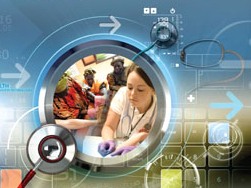Experts agree that today’s nurses are essential to the international health perspective
By Debra Wood, RN
Illustrations by Ryan Etter
Today’s nurse—whether in Baltimore, Beirut or Bangkok—is a global nurse.
A global nurse is culturally sensitive, collaborative, and knows that conditions like heart disease, cancer, obesity, diabetes, and infections have no borders. A global nurse understands that technology has created a smaller world, with people in instant contact and eager to share information. A global nurse knows that what happens in one part of the world affects the others, including the U.S.
For this issue of John Hopkins Nursing, we decided to explore what it means to be a global nurse. We began by calling and emailing experts—international leaders in global health—to see what they had to say through a “virtual” conversation.
Our “virtual” conversants, led by Martha Hill, PhD, RN, dean of the Johns Hopkins University School of Nursing, were:
• Huda Abu-Saad Huijer, PhD, RN, professor of Nursing Science and director of the Hariri School of Nursing at the American University of Beirut in Lebanon
• Gail H. Cassell, PhD, vice president of scientific affairs and distinguished research scholar at Eli Lilly and Co. in Indianapolis
• John Daly, PhD, RN, Dean of Faculty of Nursing, Midwifery & Health at the University of Technology in Sydney, Australia and Head of WHO Collaborating Centre for Nursing, Midwifery & Health Development
• Sabina De Geest, PhD, RN, professor of nursing and director of the Institute of Nursing Science Faculty of Medicine at the University of Basel in Switzerland
• Michael P. Johnson, MD, MPH, deputy director of the U.S. National Institutes of Health Fogarty International Center in Bethesda, MD.
• Thomas C. Quinn, MD, MSc, director, Johns Hopkins Center for Global Health
• Anne Marie Rafferty, DPhil (Oxon), RGN, head of the Florence Nightingale School of Nursing & Midwifery, King’s College London
• Mary Woolley, president of Research!America, a not-for-profit, grassroots public education and advocacy organization in Alexandria, Va.
Let’s start with the basics: What is global health?
 According to the Consortium of Universities for Global Health, the term indicates an area of study, research, and practice that places a priority on improving health and achieving equity in health for all people worldwide.
According to the Consortium of Universities for Global Health, the term indicates an area of study, research, and practice that places a priority on improving health and achieving equity in health for all people worldwide.
Anne Marie Rafferty’s definition—“Global health is concerned with systems, the interdependence between them and how they impact on the experience of healthcare at local, national and international levels”—adds an interactive infrastructure to the definition and is further expanded on by Martha Hill: “It’s [also] about long-term relationships that are mutually beneficial and addressing issues that span borders.”
Thomas Quinn notes that it “… incorporates multiple disciplines, interdisciplinary approaches to solving the health problems of the world. … It’s not limited to one field. It belongs to all fields of expertise, directly or indirectly related to healthcare and health well-being for all people.
The health of everyone on the globe is obviously interconnected, but why should nurses, in particular, care about global health?
“Nursing is integral to the definition of global health,” says Quinn. “Nurses can play a more important role than just providing the care. They can help shape policy about how care should be given and [develop] best-case scenarios for improvement in life and building the health capacity of a country.”
But being a global nurse, he says, doesn’t necessarily mean practicing nursing “beyond the borders of the U.S.” It can also mean being a nurse in your own community. “It’s still practicing health equity and that’s the common denominator of the issues,” he says.
Whether working at home or abroad, having a global perspective—and experience—can offer nurses opportunities to grow and to serve, says Huda Abu-Saad Huijer: “International experience for nurses presents a powerful and rewarding option in addressing leadership development challenges, both global and domestic.”
So taking part in global initiatives benefits nurses too?
 Absolutely, says Hill: “It provides growth opportunities in terms of how we see ourselves, the world, and how we interact.”
Absolutely, says Hill: “It provides growth opportunities in terms of how we see ourselves, the world, and how we interact.”
Participating globally provides “stunning and exciting” opportunities to “learn, partner, innovate, collaborate, and build capacity,” she says. Practicing abroad or working with international partners can “enhance one’s career, and you thrive with the intellectual and professional relationships and opportunities.”
Sabina De Geest calls this “bringing scientific oxygen to the system.” She believes that “by experiencing different systems, you will have a better appreciation of your own system.”
Experiencing these different systems, adds Mary Woolley, is an ongoing educational opportunity: “We can learn from experiences in a nation other than the U.S. and bring it [back home]. The learning can go the other direction as well. It needs to be constantly informing, so problem solving can take place.”
That kind of international collaboration sounds really rewarding. What can nurses do to help improve global health?
“The possibilities are endless for nurses in global health. They range from providing an educational role to doing research in a focused way,” says Gail Cassell, alluding to a wide variety of opportunities for nurses to make a difference. The common thread among them, she says, is that “nurses bring a patient-centered focus to the global health team.”
Rafferty also spoke to the value that a nurse’s perspective offers: “Global nurses practice in a way that is consistent with the values, mindsets, and behaviors associated with global citizenship and play a role in leading change, promoting what I’d call cosmopolitan values in a sustainable way.”
Nursing has an “untapped potential,” says John Daly. In his view, nurses are able to “develop and implement models of care which will contribute to the renewal and strategic development of sustainable, quality primary care. Well-educated nurses are well positioned to contribute to health system reforms and healthcare capacity development.”
What challenges will nurses be facing as we move into the future?
 Improving health worldwide is a daunting task, and the obstacles are many. Daly points out that nurses are poised to meet the challenges of “providing care in under-resourced, chaotic healthcare environments; managing the increasing demands for nursing care in a context of work force shortages, dealing with increasing complexity in medical therapy, adapting to advances in technology, dealing with quality and safety issues, and the challenge of providing safe, quality, timely care.”
Improving health worldwide is a daunting task, and the obstacles are many. Daly points out that nurses are poised to meet the challenges of “providing care in under-resourced, chaotic healthcare environments; managing the increasing demands for nursing care in a context of work force shortages, dealing with increasing complexity in medical therapy, adapting to advances in technology, dealing with quality and safety issues, and the challenge of providing safe, quality, timely care.”
The key to future success, says Rafferty, will be in collaboration across disciplines and across borders: “We need to search for solutions to create sustainable welfare systems and seek out the evidence from best-in-class practice—not only from so-called developed but developing countries. Creativity and ingenuity are our currency for survival, and we need to encourage nurses to design new ways to deliver care with patients, to co-create new ways of tuning into patients’ preferences, to be engineers of change.”
According to Daly, nurses will also need to “adjust to—and in some instances lead—advances in primary healthcare and new models of care even in acute care environments.”
It’s a tall order. But will we have enough nurses to meet such problems head-on? Every global health leader we spoke with expressed concern about the global nursing shortage.
“A [silver] tsunami is developing,” warns De Geest. Worldwide, our population of nurses—and patients—is aging. “We will be hit at a certain moment in the coming years, with workforce shortages being a major problem for all of us.”
“The global nurse shortage affects healthcare delivery in every corner of the world and will require interventions from all sectors of society, agrees Huijer. “There is also an increased demand for nurses with enhanced skills who can manage a more diverse, complex and acutely ill patient population than ever before.”
In response to the shortage, global nurses will look for ways to develop nursing capacity in every corner of the globe, says Michael Johnson. “If we want to teach sustainability and see true partnerships and relationships” when U.S. nurses conduct research and practice activities abroad, he notes, efforts must “be related to capacity building in the country.”
How can we create a sustainable global nurse workforce to tackle these challenges?
“Developed countries [like the U.S.] must be more attentive in exploring actions to stabilize and increase their domestic supply of nurses and moderate demand through strategic investments,” says Huijer. “Even without the migration of so many qualified health professionals to work in developed countries, most less-developed countries do not have the healthcare workforce capacity to respond to the health problems of their citizens.”
The migration of nurses away from countries that need them most, says Huijer, “can threaten global health,” which could make health, especially nursing, “a legitimate focus of international aid and democracy building.”
Quinn believes education, not migration, is the key. Developing nurse leaders, educators, and mentors, he says, will attract more students to the field. “In many countries nurses are relegated to a second tier and that needs to change. They need to be empowered to be the leaders of their own field and shape it for future generations to come,” he says.
Caring for the world seems to be an overwhelming task. Can we really make a difference?
Woolley certainly believes so. “People want a connection to worldwide society, not just their own. I think we will see people make time for issues outside their current experience and expertise,” she says. “The information environment we live in makes it possible to feel we are engaged with the globe anywhere, anytime, if we want to be.”
And nurses certainly do want to be connected, says Woolley. “Nurses are getting involved in the vision that global health is America’s health. They are looking for ways to get involved.”
“We can make a difference for people in our own country and abroad,” says Quinn. “My advice: Stay active, stay open to suggestions, and look to the world.”
